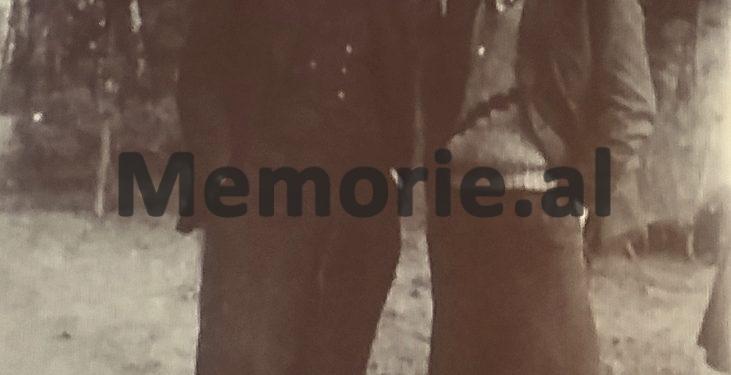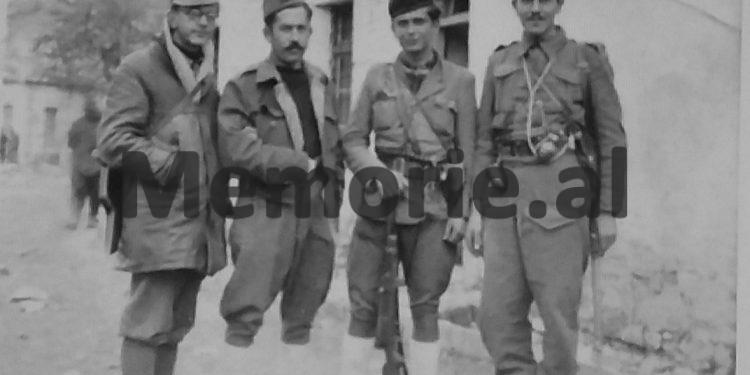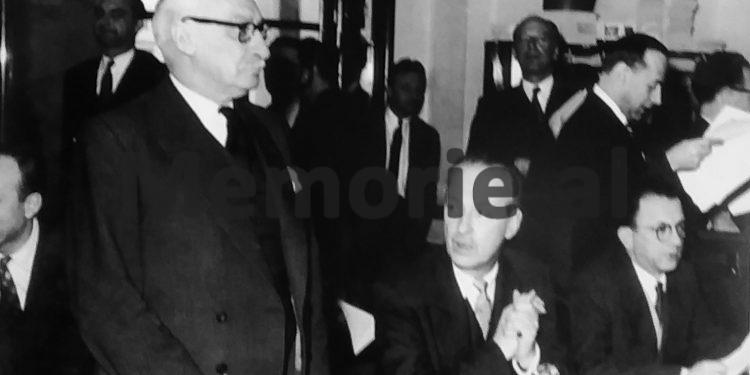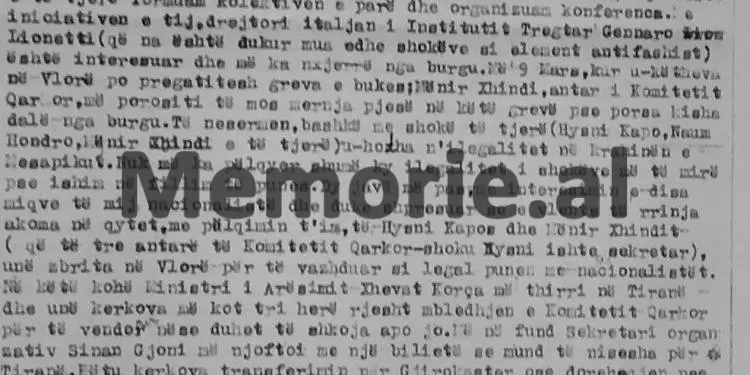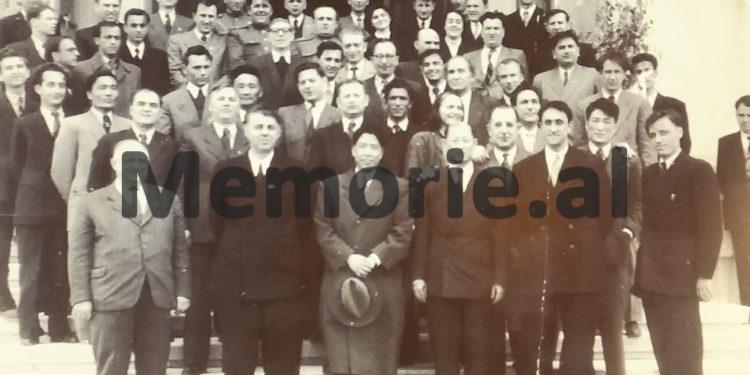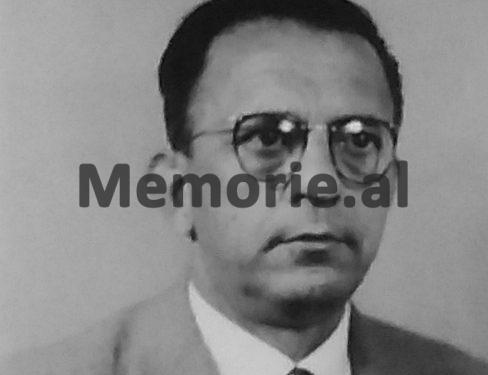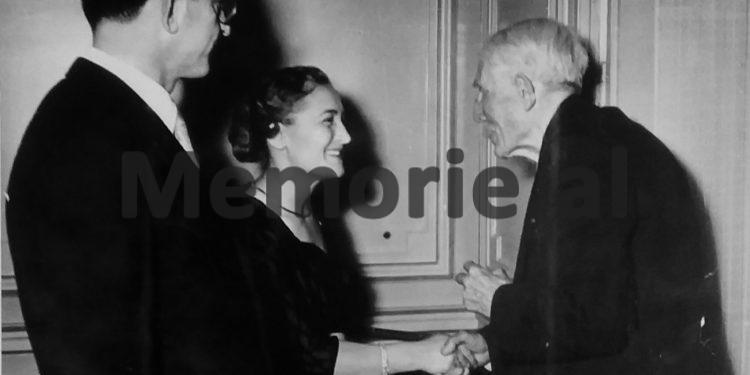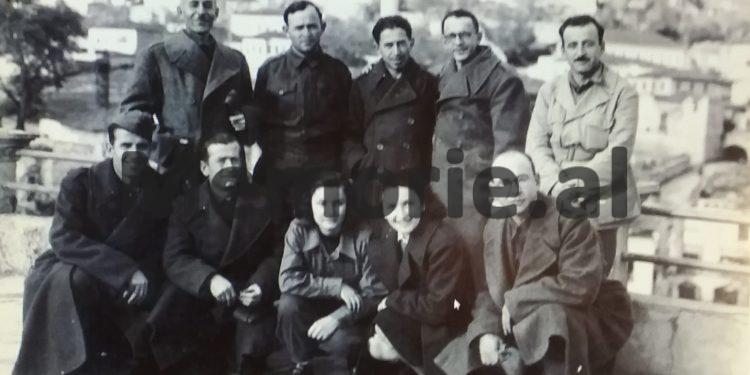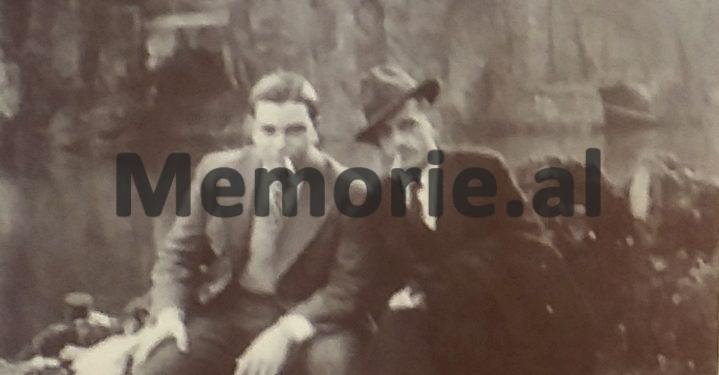Dashnor Kaloçi
Memorie.al publishes the unknown story of Shemsi Totozan, originally from Delvina, first educated at the French Lyceum in Korça and then at the University of Strasbourg in France, where he studied for several years for Literature but was unable to complete it. dot them, after being forced to return to Albania, for health reasons, and start working as a teacher in the city of Gjirokastra and then in the Vlora Shop, where he had students Hysni Kapon and came in contact for the first time with ideas communist, being activated by the “Youth Group” led by Sadik Premtja. The whole story of Totozan according to the autobiography he left written, as well as the testimonies of his son, from: engagement in the Antifascist Movement as one of the main cadres of the War in Southern Albania, conflicts with Miladrin Popovic, arrest by Italians and detention in Tirana, mission in Greece sent by the Communist Party, appointment to Enver Hoxha’s General Staff, appointment after the end of the war, as Secretary General of the Ministry of Education, conflicts and beatings by Koci Xoxe, as “enemy” , rehabilitation and sending in 1953 as Albania’s ambassador to Paris, transfer to Sofia and return to Albania, due to the beating and punishment of his bachelor, Bedri Spahiu, appointment and work as Director of the National Library, where he was monitored by the Security with wiretaps, conversations with his close friends against Enver Hoxha, and even his arrest and sentencing as an “enemy of the people”, with ten years in prison, and subsequent internment in Bel sh of Elbasan, from where he was released only in 1990, when he passed away without seeing the collapse of the communist regime.
“In 1956, when Bedri Spahiu was hit, Enver Hoxha summoned all the ambassadors of Albania to Tirana, in order to explain to him about his dismissal from all party and state functions. At the time, the father was Albania’s ambassador to Paris and was attending a meeting in Geneva. When Shemsiu came to Tirana, Enver Hoxha communicated the transfer from the Paris embassy to our embassy in Sofia, Bulgaria, and the main reason for that move was the sentencing of Bedri Spahiu, whose wife was our mother’s sister. This transfer marked the first blow to the father because then he was removed from Bulgaria and returned to Albania, where he was appointed Director of the National Library in Tirana. During that time, until he retired in 1967, his father was regularly monitored, even with eavesdropping devices that were placed in the office premises of the National Library. After all those surveys, in 1968 Shemsiu was removed from Tirana and transferred to the city of Elbasan, where he was arrested on October 23, 1974, accused of agitation and propaganda and sentenced to ten years in prison and then to exile “. The man who speaks and testifies for the first time for Memorie.al, is Vojo Totozani, a Chemical Engineer by profession, who tells the whole painful story of his father, Shemsi Totozan, who had studied Literature at the University of Strasbourg and one of the communists. the first of the Gjirokastra district, who together with Bedri Spahiu, led the whole partisan war in the South of Albania. What was Shemsi Totozan’s past like, how did he first connect with communist groups in France and Albania, and what was his activity during the period of fascist occupation in Vlora and Gjirokastra? What were the functions that Shemsi Totozani held after the end of the war, what did he say about Enver Hoxha when he was suffering for years in prisons and internments?
Who was Shemsi Totozani?
Shemsi Totozani was born on December 30, 1911, in the small town of Delvina, where his father, Xhemali, was serving as a clerk in the local administration. The origin of the Totozani family is from the city of Gjirokastra and its ancestors lived in the Dunavat neighborhood, before Shemsi’s father, Xhemali, went to study in Turkey where he graduated in Jurisprudence. After returning from his studies until his death in May 1924, Xhemal Totozani served for several years as an investigator, police commissioner and deputy prefect in several districts of the country. His son, Shemsiu, after finishing primary education in the stone city of Gjirokastra, went to the city of Korça where he attended the French Lyceum, which he completed with high results in 1931. Regarding the period that Shemsiu was in the city of Gjirokastra and then at the Lyceum of Korça, in his memoirs, among other things, he wrote: “In 1928, together with some friends, we objected to participating in the National Entity in Gjirokastra and I tried to sabotage it. That’s why I was in danger of appearing in court. In 1931 I was arrested for three weeks for several articles by Fan Noli and Halim Xhelos. Also in 1932, I was arrested for a few days accused of being an anti-Zogist, and that had something to do with the Vlora organization. ” After graduating from the French high school in Korça, based on the high results he achieved in his studies, Shemsiu received a state scholarship to pursue higher studies in France.
Student of Literature in Strasbourg
After receiving a scholarship from the government of King Zog, Shemsi Totozani and his close friend Sulo Klosi (shot by the communists in 1946) went to France and began studying at the Faculty of Letters at the University of Strasbourg, which he did not. managed to complete it, after interrupting it twice in 1935 and in 1937. The reason for the interruption of studies at the Faculty of Strasbourg was due to an incredibly difficult operation he performed on his right eye. During the time that Shemsiu stopped studying and returned to Albania, he worked as a teacher in the city of Gjirokastra where his family lived. Regarding the period of studies in France, contacts with French communist groups and returns to Albania due to his health condition, in his memoirs, among others, Shemsi Totozani wrote: “During the period I was in France, I was very enthusiastic about the creation. of the Popular Front and I have always been a good supporter of the communists. That’s all. The days when I was given the opportunity to meet a group of organized communists, I had to return to Albania. In 1935, I took an active part in the “Fier Movement” and I was one of the main organizers for the preparation of the uprising in the city of Gjirokastra “, Shemsiu wrote about the period of studies in France and the persecution by the Zogist government.
Meeting Qemal Stafa and communist ideas
After the first interruption of his studies in France in 1935, Shemsiu returned to Gjirokastra and immediately began to establish ties with the few communists who were in Albania at that time. He established these connections mainly at the Vlora Commercial Institute, where he was appointed lecturer in 1937. Regarding this, in his memoirs, among others, Shemsiu wrote: “When I returned to Albania, I became interested in issues. communist and I had my first contact with Aristidh Qëndron in 1938, through my friend Shemso Çelo, who promised me that he would connect me with other friends in Vlora. From the desire to work, it seemed to me that a whole world was opening up before me, so much so that I did not pay attention to the words of Qemal Stafa, who tried to attract me to his group. This is understood because of the rotten conspiracy that existed then. Since no connection came to me from Aristidhi, I started working on my own, with my two students from the Commercial Institute, Hysni Kapo, and Sinan Gjoni, until I finally connected in Vlora with the “Youth Group” led by Sadik. Friday. In that group where I found a healthy job, I worked closely with Sadik Premten and Sinan Gjoni, and during all that time, I discussed and was in favor of uniting the communist groups, but none of my friends in Vlora paid attention to me. On the eve of the formation of the Communist Party, in addition to the political work I did at school, together with my students, I participated in the great demonstration of November 28, 1941. With the formation of the Communist Party of Albania, I broke away from the Group of Vlora and the day of the organization of the Party in Vlora, I found that we were entering a really serious work. I don’t know because then Dushani (Mugosha) and another friend who was in charge of the Party did not look favorably on the intellectuals in the Party. They verbally told me such a thing when we were in Gjirokastra “, Shemsiu wrote in his memoirs, regarding the first contacts he made with the communist movement and Qemal Stafa, one of its main leaders. Regarding the period that Shemsiu was in Vlora, one of his relatives, the famous writer, and critic Dalan Shapllo, testified: “In 1941, after Shemsiu married Sido Puton, he took her from Gjirokastra to Vlora and both they lived in a rented house where I often came to meet them. At that time, Shemsiu was known by the nickname “Professor” and he turned that house into the main base of the Antifascist Movement, where all the communist leaders of the Vlora Region gathered, such as Hysni Kapo, Sadik Premtja, Fejzo Gjomema, Sinan Gjoni, Mynir Xhindi, etc., to whom Sido was made to eat and to wash his clothes. When they had a meeting, Vlash Arap and I would leave the house and go for a walk on the seashore, ”recalled Dalan Shapllo, a well-known writer and literary critic, when he went to Vlora with his cousin Totozani.
Head of Gjirokastra Region
From the beginning of 1942, according to the instructions of the leaders of the Communist Party of Albania, Shemsi Totozani left Vlora and settled in his hometown of Gjirokastra. Regarding his activity during that period, in his memoirs, among other things, he wrote: “As a result of the demonstration of November 28, February 26, 1942, I was arrested and held for a week in the Tirana prison, wherewith friends Fejzo Gjomema, Gaqo Nasto, etc., we formed the first team and organized conferences. At his initiative, the Italian director of the Vlora Commercial Institute, Gennaro Lioneti (who seemed like an anti-fascist element to me and my friends) became interested and took me out of prison. On March 9, when I returned to Vlora, you were preparing the strike of “Buka” and Mynyr Xhindi (a member of the Regional Committee), instructed me not to take part in that strike, as I had just been released from prison. The next day, along with other friends: Hysni Kapo, Naum Hondro, Mynyr Xhindi, etc., I went underground in the Mesaplik area. I didn’t really like that illegality of best friends, because then we were at the beginning of our work. Two weeks later, with the interest of some of my nationalist comrades and with the consent of Hysni Kapos and Mynyr Xhindi, I went back to Vlora to work illegally with the nationalists. At that time, the Minister of Education, Xhevat Korça, called me to Tirana and I asked three times in a row for the meeting of the Regional Committee to decide whether I should go or not. Finally, the organizational secretary, Sinan Gjoni, informed me of a ticket that I could leave for Tirana. When I came to Tirana, I asked to be transferred to Gjirokastra, or to resign, because if I stayed freely in Vlora I would fall into the hands of the fascists. I referred that issue to Comrade Shule (Kristo Themelkos) who replied that: that issue should have been resolved by Vlora. In Vlora, I found only my friend Manush Myftiu, because the other members of the District were outside the city. We both agreed that I should go to Gjirokastra. In April 1942, I joined the Gjirokastra organization, first as a simple member and then as a member of the Regional Committee, in charge of working with the nationalists. There in Gjirokastra, I did political work, especially in school, until its closure in May 1942. Outside of school, according to the Party’s instructions, I kept in touch with nationalists such as Faik Quku, Koço Muka, etc. Also at that time I worked with different layers and sabotaged the recruitment of militia soldiers. At the time, I objected to the party’s decision to hold a demonstration that seemed premature, which was later canceled by the District Committee itself. On July 16, 1942, due to a document of the Vlora organization that had fallen into the hands of the enemy, I was thrown into illegality, where I stayed even in the most difficult days of the reaction, taking refuge in both poor families and to those of wealthy aghallars. During that time I have taken a fair stand against nationalist elements and later against the National Front. On April 6, 1943, the Regional Committee decided that the illegal comrades should leave the city and after a short time I stayed in Libohova and Labova, I went to Poliçan which became for a long time the center of all our activity “, wrote between among others, Shemsi Totozani, regarding his activity in the Vlora and Gjirokastra District.
Conflict with Miladin Popovic
Back in 1943, when Shemsi Totozani was still in the Gjirokastra District, where he and Bedri Spahiu were two of his main leaders, he had several conflicts with the Yugoslav emissary Miladin Popovic, who used his authority and annulled Shemsi. member of the Political Section in the VI Partisan Brigade which had just been assigned to him. Regarding this and his subsequent activity, among other things in his memoirs Shemsiu wrote: “After the capitulation of Italy, our forces entered Gjirokastra and at the time when the Germans entered, I was in Greece to connect them with The Greek Communist Party and the EAM at the 15th Regiment. When the VI Brigade was being formed, Dushani appointed me as a member of the Political Section, but after the first operation, this decision was annulled and I was appointed in charge of Aggj-prop, (agitation and propaganda) at this Brigade. The reasons given to me for this reduction were not at all relevant. Of course, I was not happy and my performance for the two or three months I was in the Brigade was not good. On May 2, 1944, by order of the General Secretary of the Party, I went to the General Staff in Helma, in charge of Agji-Prop. It was only after the Përmet Party Congress, when Comrade Enver explained everything to me, that I changed my mind about the reasons for my resignation at the beginning. Later, as the head of the Party organization, I participated in the conferences of cadres that took place in Helma, Odrican, Berat, etc. “, recalls Shemsi Totozani in his notes, regarding the conflict he had with the Yugoslav emissary Miladin Popovic and the meeting with Enver Hoxha, but without explaining the real reasons why they did not leave him in the position of member of the Political Section of the VI Brigade where they appointed him at the beginning. After the end of the war, Shemsi Totozan was appointed Secretary-General of the Ministry of Education in Tirana, where he was also the Secretary of the Party Cell of that department. From the beginning of his tenure in that Ministry, Shemsiu faced many problems and injustices that were done to ordinary members of the Party who could not raise their voices for fear of having consequences.
Being an idealistic communist, formed with the ideals of Western social democracy since the time he had studied in France, Shemsiu could not stand those brutal methods in which Party members met at the time. Based on that, Shemsiu raised the issue of the attitude that was held towards the deputies Riza Dani and Selaudin Toto, which at that time was a very delicate problem and for which he had consequences by being dismissed from office and arguing anti-party element.
The first blow in 1945
Regarding the period when the first attack on him began, in the memoirs, he left written, among others Shemsiu states: “After the liberation, I was Secretary of the Cell at the Ministry of Education and in 1945 member of the Committees of Digesters. In this Committee, which was attended by First Secretary Comrade Teodor Heba and Second Secretary, Comrade Kahreman Ylli, the three of us often raised verbal and written reports on issues that did not seem fair to us. For this reason, we have been advised by Pandi Christos from time to time, and finally, the leaders of the Ministry of Interior deliberately ordered the three of us to separate from each other. Comrade Teodor was transferred to Durrës, as First Secretary of the Party, and Comrade Kahreman went to Paris. I raised in close party activism, the lack of democracy in the Party, the lack of criticism and self-criticism, the issue of the fear of Party members to raise the issue, the issue of MPs Riza Dani and Selaudin Toto in 1945. I have these Koci Xoxes, who did not call them rights, also spoke directly. Of course, after that came successive blows to me. In October 1946 I was transferred to the Ministry of Justice as Secretary-General and in December 1956 I was sent to the Director of the Pedagogical School “17 November”. I was not given any reason for this treatment, and I could not find any strong reason in myself. The Tirana Regional Committee removed “serious remarks with a warning in the biography”, on the grounds that: “I had spoken out against the cooperatives”, “I had gone against the decisions of the Regional Committee”. Since that date I have been looked down upon everywhere, my name was mentioned everywhere in various Party organizations, as an enemy and anti-party element. Old friends didn’t dare talk to me, slander about me was on the agenda, and at every meeting of the basic school organization, a delegate from the District or City Committee would come to hit me, because I was ” dangerous element ”. Even the Ministry of Education is trying to hit me. These persecutions against me continued until the 11th Plenum of the Central Committee “, it is said in Totozan’s memoirs, regarding the years 1945-1947, when he was hit by the Party as an” enemy “. Also during that period, Selfixhe Broja (Ciu) testified, recalling, among other things: “In a Party activism, Shemsiu raised the issue of the lack of democracy in the Party, which sparked fears of raising issues that seemed wrong. , such as, “The Court of Deputies”. After that, the crackdown on him began, becoming the most unscrupulous slander. At that time, he was forced to address a memorandum to the Dictatorship, raising not only his problem but also the headless path where the Party had entered “, recalled Totozan, the former famous publicist of the ’30s. , Selfixhe Broja, who in the first years after the war worked with him at the Ministry of Education.
Ambassador to France
The strike on Shemsiu continued until the end of 1948 when the 11th Plenum was held, otherwise known as the “Party Turn”. At that time, Enver Hoxha, according to the instructions he had received from Moscow, hit Koci Xoxen, whom he saw as his rival at the head of the Party, and charged him with all the “mistakes” that had been made. At that time, a very large number of communists were rehabilitated, who were considered “anti-party elements and enemies”, and in that context, Shemsi Totozani was rehabilitated, who was initially appointed Director of Education in the Ministry. He refused to start work without first clarifying his position, and requested a meeting with Tuk Jakova, who at the time held the position of Second Secretary of the Central Committee. In that meeting with Tuku, in addition to personal issues, he raised other issues that severely compromised democracy in the Party, which Tuku not only welcomed but also helped by proposing him as Albania’s ambassador to Paris. So in 1953, Shemsi Totozani went to France, with the post of ambassador, and some of his former colleagues at the time testified that Totozani had been one of Albania’s most dignified representatives in Paris. One of Totozan’s colleagues says that: during the handing over of credentials and after the ceremony, the President of France, Charles de Gaulle, was completely surprised and amazed by the French language (which Shemsiu spoke fluently, just like Albanian) and its extensive culture. From the first moments of that meeting, the French President spoke to Totozan, telling him that: of all the ambassadors accredited to France, whom he had the kindness to receive, it was no coincidence that he spoke French. in that way. Regarding the period that Shemsiu served at the Albanian Embassy in Paris, Selfixhe Broja testified With the culture, education, and sharpness that characterized Shemsiu, he knew how to represent himself in the most dignified way in all diplomatic circles in Paris. But at that time he had a lot of problems, which came as a result of the lack of reconciliation with the staff, which had double dependencies and especially the barricade he inflicted on financial abuses and dubious expenses, made by Llambi Peçini (Head of Intelligence, near that embassy) which at that time had full independence. Shemsiu spoke out against the incalculable financial costs of the subsidy given at the time to the Marxists, whom he angrily called “Europe’s horns.” But the denunciation of Shemsiu to those problems at the Albanian embassy in Paris, created many consequences in Tirana, personally attacking him with Enver Hoxha, who had also signed funding for Marxist-Leninist groups, who were regularly paid twice. per month from the Albanian embassies in Paris and Rome ”.
The blow after Bedri Spahiu
The rift that developed between Totozan and Enver Hoxha when he was ambassador to Paris also coincided with the blow that Enver then inflicted on Bedri Spahiu, Shemsi’s bartender. After that, Enver Hoxha removed Shemsiu from France and initially sent him as ambassador to Sofia, Bulgaria, a transfer which meant a bleak future for him. Regarding this, Shemsi’s son, Vojo Totozani, testifies: “At the time Bedri Spahiu was hit, Enver Hoxha summoned all the ambassadors of Albania to Tirana, in order to explain the reasons for his dismissal from all functions. party and state. At the time, the father was at a meeting in Geneva, and when he arrived in Tirana, Enver communicated the transfer from Paris to the Albanian embassy in Sofia. During an official celebration at the time, when it came time to meet the ambassadors, Enver Hoxha demonstratively passed Shemsi without giving him a hand. The main reason for that transfer and stay was due to the blow of Bedri Spahiu, whose wife was the sister of our mother and that move was the beginning of the severe blow that the father would suffer later because he was removed. also from Bulgaria and brought to Tirana. After being fired for nearly two years as a State Department official, in 1957, he was removed and appointed Director of the National Library, where he was constantly monitored by the State Security Service. even and eavesdropping on office premises. Even in those conditions, the father worked with the greatest dedication, enriching the Bible fund with the most selected books, but even for that he encountered great obstacles and was accused from above of putting reactionary ideology into the library… Extremely revolted by the situation in which he found himself, his father occasionally vented his anger with his closest friends, such as Professor Eqerem Çabej, Selfixhe Broja, Zef Mala, Nonda Bulka, etc., to whom he told: ‘Woe to these people, who are denied spiritual and mental nourishment.’ Likewise with those friends of his, at that time his father was discussing the abuses and privileges of the high leadership that resided in the “Bloc”. All of this influenced his expulsion from the Party in 1956, and the motivation then was: You have expressed foreign views on the Party.
You have spoken out against ties and friendship with China.
In France, you had connections with the enemies of the Nation.
You have propagated Western culture.
At the end of that meeting, where Faik Shehu was the delegate, the father said: “I am convinced that one day the Party will accept me again in its ranks.” Faik Shehi said: ‘Which Party are you talking about, that of Enver Hoxha’? the father replied: ‘No, for the Albanian Labor Party’. “His stance on the District Committee was very manly, and he turned from an accused to an accuser.” This is confirmed by Selfixhe Broja, who testifies, among other things: “After those accusations, when they told Shemsi to apologize to the Central Committee and denounce his friends, he replied: My name is Shemsi Totozani and I have been all my life. honest and I will die like that ”.
10 years in prison and internment in Belsh
After Shemsiu did not apologize and did not make self-criticism, Enver Hoxha said: “Let him go to Elbasan, start from scratch”. Regarding the period in which he lived and where he was later arrested, his son, Vojua, testified: “In the city of Elbasan, my father worked for some time as a teacher and in 1967 he retired as a teacher. During that period until 1974, when his father was arrested, he was constantly associated mainly with Qamil Çela (the first communist in Albania), who had his closest friend. In addition to Qamil, Ymer Dishnica, Peço Kagjini, Muhamer Spahiu and some other intellectuals, such as Perikli Sheti, with whom we had family friends, also came to our house. Among Tirana’s friends, those who never forgot their father, even when they took him to Elbasan, were Dalan Shapllo with his brothers. The father had an extraordinary mood and with those friends, he always stayed in the cafe, where among other conversations they discussed Enver Hoxha.
Paraphrasing Victor Hugo in his poem on the Third Napoleon, the father kept telling his comrades: ‘If there were 1000 opponents left, one of them would be me, if there were 100 left, again one of them would be if I were him, and if there was one of his opponents left, he would be me. ‘ All of this led to his father’s arrest in 1974, and after being held for six months by the investigator, he was sentenced to ten years in political prison and confiscation of property. Shemsiu was initially wanted as a “UDB agent”, but after failing to find witnesses, he was convicted of “agitation and propaganda”. During the court hearings, the father turned into an accuser, and that then resonated. Among those friends of the father who refused to give false testimony against him, were: Ferik Toto, Faik Çoçoli and Leonidha Qirjako, who also had great pressure and severe consequences afterward. Likewise, Qamil Çela, who refused to testify against his father, was deprived of his vital pension. At the time the father was convicted, our mother Sidon, who was a 1941 communist, was expelled from the Party and fired, demanding that she wait at home for Bedri Spahiu’s mother-in-law, who was also a mother. her. The father suffered mainly in the Ballsh camp and was released from there in 1982, taking advantage of the amnesty granted to the elderly over 60 at the time. After his release from prison, his father spent most of his time at home designing a French-Albanian Phraseological Dictionary, which he had been compiling for 10 years. That dictionary was seized by investigators when he was arrested, thinking there would be compromising material, and he was given back. But the father did not have much free time, because in 1986 when he was 75 years old, he and his mother were deported from Elbasan to Belsh. In the town of Belsh, the father went crawling and holding his mother by the arms because he was very ill. Shemsiu remained in exile there until November 1990, when the Internment Commission was dissolved. During that time, the views of the communist dissident led his father to a complete ideological and political metamorphosis, and he called Enver Hoxha a “traitor to the ideals of war.” In November 1990, the two of them returned to Elbasan with their mother, but due to the many sufferings of imprisonment and internment, he did not live more than two months “, concludes his painful story, Vojo Totozani, about his father his Shemsi, one of the honest and idealistic communists, who never agreed to the dictates of Enver Hoxha and as a result of his rebellion, suffered for 15 years in prisons and internments./Memorie.al




